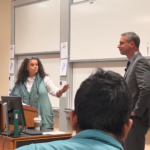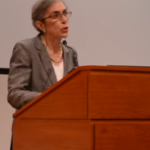Critical Thinking Without Knowledge
I had a student last year who wrote me his life story. When he was a little boy, he knew he could do anything. His parents loved him, he loved life, and when he grew up he knew he wanted to “be a CEO.” Then he got to the University. There he learned that he could not be a CEO because he was “a minority.” He learned that the whole world would be against him, that he was a victim, and that he had to devote his life to “helping others.”
His paper was well written, and it was sad; beautifully he wrote those discouraging words. I noted in the margin: “Is this what you want to teach your sons—that they are victims?” I pointed out that the best way he could help people was to become that CEO and hire lots of people. At the end of the quarter when the class “sat council” in a circle to express what they had learned and what they liked and disliked, the talking stick came to him. He took it. He said that my marginal notes on that paper really made him think. He realized he did not want to pass along to his children the lesson of victimhood, helplessness, and anger. He understood he could re-connect with his own childhood dreams of being a CEO if he still wanted to. Under the influence of his radical Sociology teachers, he had by that time decided to become a Sociology professor, but with any luck he will go forth and not spout pure ideology. I did my best to teach him that Sociology is to observe social patterns and not to advocate an agenda.
I had another student—this one a beautiful young brunette woman who, for some reason I could not comprehend, looked angry all the time. She wrote that she could not understand why, as a waitress, she did not earn the same amount of take-home money that the owner-operators of the restaurant did. She had learned in class that it was unfair and that her restaurant should be communistically organized, for she worked as hard as they did. She complained about the customers, too. I made her a proposition. Instead of handing in propaganda as a term paper, instead of continuing with the anger and low wages, I suggested this: make a little tally sheet for work. “Code” each table as to whether the customers are “jerks” “in the middle” or “really nice”. Then code her own behavior vis-à-vis each set of customers on the same continuum, from jerk-to-nice. Then, beside each “case,” write down the tips. She came in a few weeks later with a decent term paper, a smile to match her God given beauty, and more money in her pocket. She had been taught to resent the rich; she hadn’t known that she was part of the picture of her own oppression.
I had a student this week who was “hot” about Arizona law SB1070. Here we are in Los Angeles and none of the students in the class knew about LA Special Order 40 which outlaws local police from turning over known illegal aliens to ICE even if the police know they are criminals—even murderers—as well as illegal aliens. Because I began the discussion with what the Arizona law actually does (which is the opposite of LA’s Special Order 40), most of the students were unable to counter my calm presentation of fact with their learned propaganda—which is that daddy might get arrested while buying us ice cream. They were silent. Indeed, I could sense from the expressions on their faces that they were kind of scared that they just actually learned something based on fact. But one fellow continued to glare. He came up to me after class about another matter, and before he got to it, I said, “I know, I know—it’s very complex, this problem, but we must start on the basis of some truth or we will never solve the problem.” Then I asked him if he remembered how, when he was just a little boy growing up, that one day he could actually reach the drinking fountain all on his own and hoist himself up for a drink. If “momma” came up behind him to help him up, he would shove aside her assistance and do it himself. He smiled because he remembered that moment of achievement and independence very well. I said, “That is human nature.” We like best to do things for ourselves. We enjoy accomplishment. He melted. He said, “I like it when you put it that way: that’s human nature. I see.”
Some of the left-wing teachers do not teach students to think with some truths. They teach them to feel oppressed, be angry, and criticize. Students are sometimes taught to criticize, and to criticize only one “side.” When I mentioned in class that San Francisco put on its ballot a proposal to allow illegal aliens the right to vote on city matters regarding schools one student laughed and said, “Oh, well that’s got to be some dumb Republican idea.” Some of the other students looked at her with embarrassment and said softly, “Well that would probably be the Democrats, not the Republicans, so . . . So shhhhhh.” The point is, if brainwashed, when one hears something dumb or evil one assumes it is from “the other side.” A brainwashed Democrat just cannot even imagine that a Democrat would be so dumb. I know because I remember when I was one of them. When something came along to stretch my own credulity, I would go, “Oh, I wonder what I am ‘supposed to’ think about this”—and I’d turn on Air America to find out. It was poison.
Is blather like this all that I hear from my students, and, through them, presumably from their teachers? No. There are good, solid teachers, to be sure. I am heartened when I hear a young woman or man speak about “our” country when I know they or their parents were immigrants and are now citizens. I love hearing “our country” from them. I feel the pot, melting. I am pleased when I see the older ones among them who have managed to get a foothold and buy a house and defend the free market. They express a feeling of lack of balance if their neighbors do not have to pay their mortgage while they pay theirs. I like it when these students engage the others in conversations about the right to own property and I can just sit back and let nature take its course. The American Dream is the drinking fountain, and they have found their way to it and they know it is good. But very many others are like the young lady who wrote of the hard, hard life that her grandmother endured. Nana had to clean and toil a half a lifetime and, though she could barely speak English, she finally got a factory job, health care, and a even small pension. The word she used for Nana’s whole life was: exploitation. I asked the student what job she felt her grandmother should have had. I asked her if she was better off sitting in the University classroom than her grandmother had been. I asked her if she knew what the American Dream is. She is it, but asleep in it.
Keep the faith, because once you learn to think critically rather than learning to criticize, the truth marches on.
Although Maureen Tabor is a congressional candidate, Accuracy in Academia takes no position on her candidacy, or anyone else’s. We are running her comments only to show the experiences that she passes on as an educator at California State University’s Los Angeles campus.
I had a student last year who wrote me his life story. When he was a little boy, he knew he could do anything. His parents loved him, he loved life, and when he grew up he knew he wanted to “be a CEO.” Then he got to the University. There he learned that he could not be a CEO because he was “a minority.” He learned that the whole world would be against him, that he was a victim, and that he had to devote his life to “helping others.”
His paper was well written, and it was sad; beautifully he wrote those discouraging words. I noted in the margin: “Is this what you want to teach your sons—that they are victims?” I pointed out that the best way he could help people was to become that CEO and hire lots of people. At the end of the quarter when the class “sat council” in a circle to express what they had learned and what they liked and disliked, the talking stick came to him. He took it. He said that my marginal notes on that paper really made him think. He realized he did not want to pass along to his children the lesson of victimhood, helplessness, and anger. He understood he could re-connect with his own childhood dreams of being a CEO if he still wanted to. Under the influence of his radical Sociology teachers, he had by that time decided to become a Sociology professor, but with any luck he will go forth and not spout pure ideology. I did my best to teach him that Sociology is to observe social patterns and not to advocate an agenda.
I had another student—this one a beautiful young brunette woman who, for some reason I could not comprehend, looked angry all the time. She wrote that she could not understand why, as a waitress, she did not earn the same amount of take-home money that the owner-operators of the restaurant did. She had learned in class that it was unfair and that her restaurant should be communistically organized, for she worked as hard as they did. She complained about the customers, too. I made her a proposition. Instead of handing in propaganda as a term paper, instead of continuing with the anger and low wages, I suggested this: make a little tally sheet for work. “Code” each table as to whether the customers are “jerks” “in the middle” or “really nice”. Then code her own behavior vis-à-vis each set of customers on the same continuum, from jerk-to-nice. Then, beside each “case,” write down the tips. She came in a few weeks later with a decent term paper, a smile to match her God given beauty, and more money in her pocket. She had been taught to resent the rich; she hadn’t known that she was part of the picture of her own oppression.
I had a student this week who was “hot” about Arizona law SB1070. Here we are in Los Angeles and none of the students in the class knew about LA Special Order 40 which outlaws local police from turning over known illegal aliens to ICE even if the police know they are criminals—rven murderers—as well as illegal aliens. Because I began the discussion with what the Arizona law actually does (which is the opposite of LA’s Special Order 40), most of the students were unable to counter my calm presentation of fact with their learned propaganda—which is that daddy might get arrested while buying us ice cream. They were silent. Indeed, I could sense from the expressions on their faces that they were kind of scared that they just actually learned something based on fact. But one fellow continued to glare. He came up to me after class about another matter, and before he got to it, I said, “I know, I know—it’s very complex, this problem, but we must start on the basis of some truth or we will never solve the problem.” Then I asked him if he remembered how, when he was just a little boy growing up, that one day he could actually reach the drinking fountain all on his own and hoist himself up for a drink. If “momma” came up behind him to help him up, he would shove aside her assistance and do it himself. He smiled because he remembered that moment of achievement and independence very well. I said, “That is human nature.” We like best to do things for ourselves. We enjoy accomplishment. He melted. He said, “I like it when you put it that way: that’s human nature. I see.”
Some of the left-wing teachers do not teach students to think with some truths. They teach them to feel oppressed, be angry, and criticize. Students are sometimes taught to criticize, and to criticize only one “side.” When I mentioned in class that San Francisco put on its ballot a proposal to allow illegal aliens the right to vote on city matters regarding schools one student laughed and said, “Oh, well that’s got to be some dumb Republican idea.” Some of the other students looked at her with embarrassment and said softly, “Well that would probably be the Democrats, not the Republicans, so . . . So shhhhhh.” The point is, if brainwashed, when one hears something dumb or evil one assumes it is from “the other side.” A brainwashed Democrat just cannot even imagine that a Democrat would be so dumb. I know because I remember when I was one of them. When something came along to stretch my own credulity, I would go, “Oh, I wonder what I am ‘supposed to’ think about this”—and I’d turn on Air America to find out. It was poison.
Is blather like this all that I hear from my students, and, through them, presumably from their teachers? No. There are good, solid teachers, to be sure. I am heartened when I hear a young woman or man speak about “our” country when I know they or their parents were immigrants and are now citizens. I love hearing “our country” from them. I feel the pot, melting. I am pleased when I see the older ones among them who have managed to get a foothold and buy a house and defend the free market. They express a feeling of lack of balance if their neighbors do not have to pay their mortgage while they pay theirs. I like it when these students engage the others in conversations about the right to own property and I can just sit back and let nature take its course. The American Dream is the drinking fountain, and they have found their way to it and they know it is good. But very many others are like the young lady who wrote of the hard, hard life that her grandmother endured. Nana had to clean and toil a half a lifetime and, though she could barely speak English, she finally got a factory job, health care, and a even small pension. The word she used for Nana’s whole life was: exploitation. I asked the student what job she felt her grandmother should have had. I asked her if she was better off sitting in the University classroom than her grandmother had been. I asked her if she knew what the American Dream is. She is it, but asleep in it.
Keep the faith, because once you learn to think critically rather than learning to criticize, the truth marches on.
Although Maureen Tabor is a congressional candidate, Accuracy in Academia takes no position on her candidacy, or anyone else’s. We are running her comments only to show the experiences that she passes on as an educator at California State University’s Los Angeles campus.




